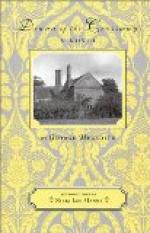Diana enjoyed her walk beneath the lingering brown-red of the frosty November sunset, with the scent of sand-earth strong in the air.
‘I had to hire a chariot because there was no two-horse carriage,’ said Redworth, ‘and I wished to reach Copsley as early as possible.’
She replied, smiling, that accidents were fated. As a certain marriage had been! The comparison forced itself on her reflections.
‘But this is quite an adventure,’ said she, reanimated by the brisker flow of her blood. ’We ought really to be thankful for it, in days when nothing happens.’
Redworth accused her of getting that idea from the perusal of romances.
’Yes, our lives require compression, like romances, to be interesting, and we object to the process,’ she said. ’Real happiness is a state of dulness. When we taste it consciously it becomes mortal—a thing of the Seasons. But I like my walk. How long these November sunsets burn, and what hues they have! There is a scientific reason, only don’t tell it me. Now I understand why you always used to choose your holidays in November.’
She thrilled him with her friendly recollection of his customs.
‘As to happiness, the looking forward is happiness,’ he remarked.
‘Oh, the looking back! back!’ she cried.
‘Forward! that is life.’
’And backward, death, if you will; and still at is happiness. Death, and our postillion!’
‘Ay; I wonder why the fellow hangs to the rear,’ said Redworth, turning about.
’It’s his cunning strategy, poor creature, so that he may be thought to have delivered us at the head of the town, for us to make a purchase or two, if we go to the inn on foot,’ said Diana. ’We ’ll let the manoeuvre succeed.’
Redworth declared that she had a head for everything, and she was flattered to hear him.
So passing from the southern into the western road, they saw the town-lights beneath an amber sky burning out sombrely over the woods of Copsley, and entered the town, the postillion following.
CHAPTER XII
BETWEEN EMMA AND DIANA
Diana was in the arms of her friend at a late hour of the evening, and Danvers breathed the amiable atmosphere of footmen once more, professing herself perished. This maid of the world, who could endure hardships and loss of society for the mistress to whom she was attached, no sooner saw herself surrounded by the comforts befitting her station, than she indulged in the luxury of a wailful dejectedness, the better to appreciate them. She was unaffectedly astonished to find her outcries against the cold and the journeyings to and fro interpreted as a serving-woman’s muffled comments on her mistress’s behaviour. Lady Dunstane’s maid Bartlett, and Mrs. Bridges the housekeeper, and Foster the butler, contrived to let her know that they could speak an if they would; and they expressed their pity of her to assist her to begin the speaking. She bowed in acceptance of Fosters offer of a glass of wine after supper, but treated him and the other two immediately as though they had been interrogating bigwigs.




